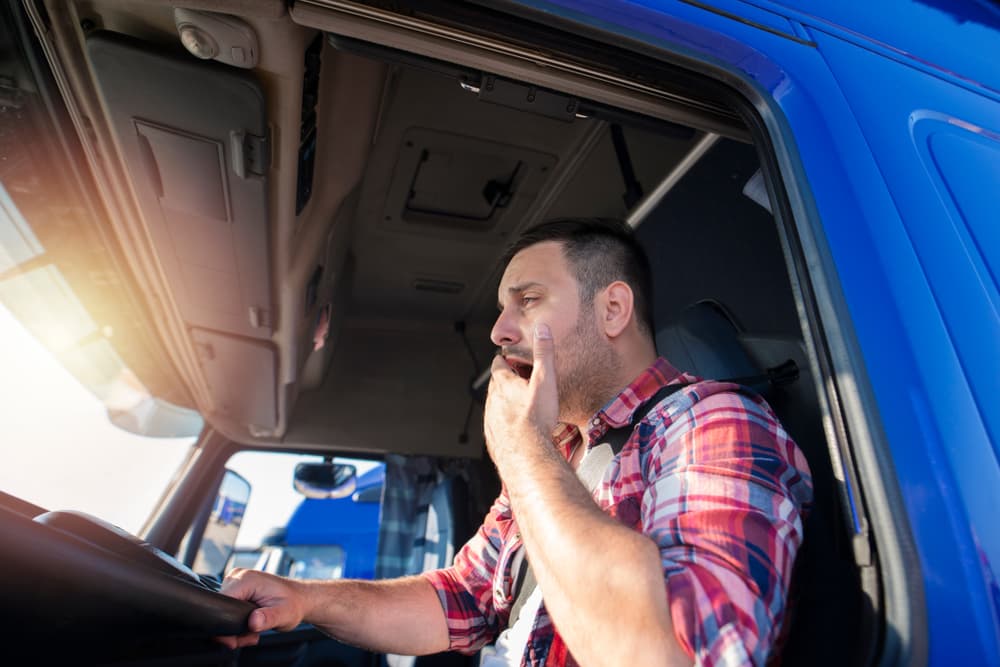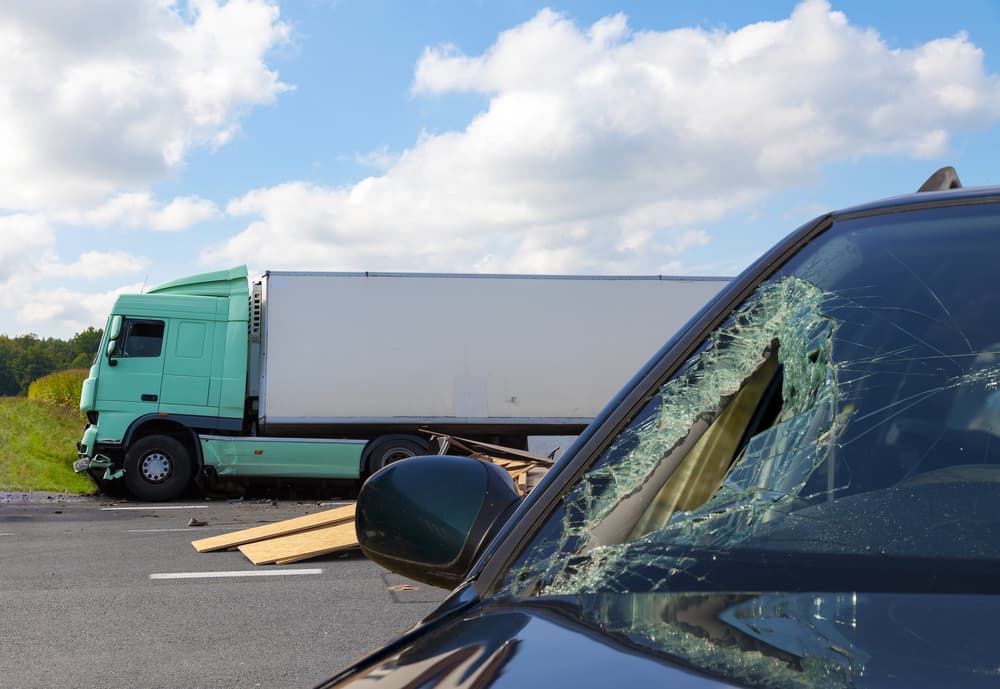Truck accidents can be particularly problematic when determining who is responsible. When these large vehicles are involved in an accident, the consequences can be deadly, making it important to understand where liability may lie. In this blog, our Virginia truck accident lawyers will explore the parties that can be held liable in a truck accident.
The Truck Driver
The first and most obvious party that may be held responsible is the truck driver; when a driver engages in risky behavior, such as speeding, the chances of causing an accident increase exponentially. Speeding reduces the driver's ability to react in time to road hazards and affects the truck's braking distance and overall control.
Distracted driving is another factor. This might involve using a mobile device, adjusting the radio, or taking the driver's attention away from the road. In truck driving, where reaction times and vehicle handling are already challenging, distractions can have severe consequences.
Driving under the influence of alcohol or drugs is, perhaps, one of the most serious offenses. It severely impairs judgment, reaction times, and overall vehicle control, making it a significant factor in determining liability in truck accidents.
However, establishing liability involves more than just pointing out these errors. It requires a clear demonstration that the driver's mistake was the direct cause of the accident and the damages that ensued.
This is where the concept of negligence comes into play. In legal terms, negligence breaches the duty of care that results in harm. For a truck driver, this duty of care includes adhering to road safety laws and operating the vehicle reasonably safely.
Establishing the driver's liability must show that their actions deviated from what a reasonably prudent driver does under similar circumstances. This involves gathering evidence such as traffic camera footage, witness statements, and police reports. Inspectors can scrutinize the driver's logs and records to identify any violations of regulations, such as driving hours and rest periods.
Furthermore, establishing the causal link between the driver's actions and the accident is imperative. This means proving that the driver's negligence was necessary for the accident to occur. For example, demonstrating this direct link is essential if a driver is speeding and can not stop quickly, leading to a rear-end collision.
The Trucking Company
Trucking companies can also be held responsible for accidents involving their vehicles. This responsibility stems primarily from the legal concept known as vicarious liability, which binds an employer to its employees' actions during their employment. This principle is particularly relevant in the trucking industry, where drivers often act directly under company directives.
Vicarious liability implies that if a truck driver, as an employee of the trucking company, is involved in an accident while performing job-related duties, the company can be held accountable for the driver's actions.
This legal concept recognizes that employers should bear some responsibility for the actions they require their employees to take and the conditions these employees operate under.
For example, suppose a truck driver is involved in an accident while making a delivery. In that case, the trucking company can be liable because the driver fulfilled job responsibilities during the accident.
However, the responsibility of trucking companies in accident scenarios extends beyond vicarious liability. It encompasses their direct actions and decisions, particularly regarding the maintenance of their fleet and hiring qualified drivers. The maintenance of commercial trucks is a crucial aspect of road safety.
These vehicles often traverse long distances under difficult road conditions, making regular maintenance essential to remain safe. If a trucking company neglects this duty, and an accident occurs due to a mechanical failure, the company can be held responsible. This might involve situations where proper maintenance leads to brake failure, tire blowouts, or other mechanical issues directly contributing to an accident.
The hiring process is another area where trucking companies have a significant responsibility. These companies must ensure that their drivers are properly qualified, trained, and fit to operate large commercial vehicles. This includes conducting thorough background checks, verifying licenses and certifications, and ensuring drivers have clean driving records.
If a company fails to conduct these checks adequately, and an accident occurs due to driver inexperience or incompetence, the company can be liable for negligent hiring practices.
In addition to these factors, trucking companies are also responsible for complying with regulations and industry standards, which include ensuring drivers adhere to hours-of-service regulations and other safety protocols.
Non-compliance with these regulations not only endangers public safety but can also be a basis for the company's liability in the event of an accident.
The Truck Manufacturer
Sometimes, the cause of a truck accident is not human error but a defect in the truck itself. In such cases, the truck manufacturer can be held liable, a responsibility grounded in the principles of product liability laws.
Product liability laws hold manufacturers accountable for ensuring that their products, including commercial trucks, are safe for use.
These laws operate on the premise that manufacturers are in the best position to detect and rectify any product defects before they reach the consumer. This responsibility is particularly important in truck manufacturing due to the potential for severe harm defects in such large vehicles can cause.
Flaws in the truck's design can make the vehicle unsafe. Alternatively, it might be a manufacturing defect, where the design is safe, but the manufacturer did not produce the truck according to that design.
This can include issues like faulty brakes, steering mechanisms that do not respond correctly, or engine problems that can lead to catastrophic failures while the vehicle is in operation.
When such defects are present and they lead to an accident, the truck manufacturer can be held liable for the damages caused. Whether the manufacturer knew about the defect doesn’t matter.
The key factor here is whether the defect was a direct cause of the accident. For instance, if a truck's braking system fails due to a defect and this failure results in an accident, the manufacturer may be held responsible for any resulting harm.
To establish manufacturer liability in truck accidents, one must demonstrate that the truck's intended use occurred and that a defect in the truck actively caused the accident. You need not show the manufacturer’s negligence, just the defect's existence and the causal link to the accident.
This often involves detailed investigations, including professional analysis of the truck after the accident, to identify and confirm the presence of a defect.
In these cases, the role of recalls can also come into play. Suppose the manufacturer had identified the defect and issued a recall before the accident, yet the manufacturer did not remedy the defect. In that case, this can further support the claim against the manufacturer. Conversely, if a recall was issued and ignored, this might affect liability dynamics.
Cargo Loaders
The safety of commercial trucks on the road does not solely hinge on the vehicle's mechanical condition or the driver's competence. One aspect often overlooked is how the truck's cargo is loaded. The task of loading cargo, seemingly simple, has significant implications for road safety. Improperly loaded cargo can create hazards that endanger the truck driver and other road users.
The process of loading cargo onto a truck requires careful consideration of factors like weight distribution, securement of the cargo, and adherence to legal weight limits. Ideally, the truck's trailer should evenly distribute the cargo.
Uneven weight distribution can lead to vehicle handling issues, making it difficult for the driver to maintain control, especially in challenging driving conditions like sharp turns or sudden stops.
Similarly, if the cargo is not properly secured, it can shift during transit. This shifting can drastically alter the truck's center of gravity, increasing the risk of rollover accidents, one of the most dangerous scenarios in trucking.
When cargo loaders fail to adhere to these safety protocols, their role in subsequent accidents becomes a point of investigation. If an accident occurs and the investigation reveals that improperly loaded cargo directly contributed to the accident, you can hold the loading company liable.
In instances where cargo loaders are company employees, the concept of vicarious liability may also come into play, similar to the liability of trucking companies for their drivers.
If the cargo loaders performed their duties when they improperly loaded the truck, their employer can be held responsible for their actions.
Liability for cargo loading is not limited to the physical act of placing goods onto the truck. It also ensures that the cargo's weight complies with legal limits by industry regulations and standards.
Overloaded trucks or those loaded in a manner that violates regulations pose a significant risk on the roads. Not only do they put strain on the vehicle's braking and steering systems, but they also increase the likelihood of tire blowouts and other mechanical failures.
Maintenance Providers
Maintenance providers are responsible for various tasks, from routine checks to more sophisticated repairs. This includes checking and servicing key components like brakes, tires, engines, and steering systems.
These components are vital to the safe operation of the truck, and any failure in these areas can lead to serious accidents. For instance, brake failure in a fully loaded commercial truck endangers the truck driver and poses a severe risk to other road users.
When a maintenance provider fails to adequately perform these tasks, which leads to an accident, their role in the incident comes under scrutiny. The crux of establishing their liability lies in demonstrating that their failure to maintain the truck was a direct cause of the accident.
This involves examining whether the maintenance provider failed to fix known issues or conduct thorough inspections to identify potential problems.
For instance, if a maintenance provider servicing a truck overlooks a significant issue with the brake system. Later, authorities can hold the provider liable if the truck is involved in an accident due to brake failure.
This liability stems from the expectation and legal obligation that they must perform their duties to a standard that ensures the vehicle's safety.
Proving the liability of a maintenance provider can involve detailed investigations. This might involve examining maintenance records, service logs, and inspection reports to establish what work occurred on the truck and whether there were any oversights or negligence.
Professional testimony often plays a role in these cases, as professionals in the field can provide insights into how a lack of proper maintenance can lead to mechanical failures implicated in the accident.
It's also important to consider the relationship between the maintenance provider and the trucking company. In some cases, maintenance providers are external contractors; in others, the trucking company may directly employ them. This relationship can affect the dynamics of liability.
For example, if the provider is an external contractor, they might bear full responsibility for their negligence. However, if they are part of the trucking company, the concept of vicarious liability can again come into play, potentially implicating the trucking company in the liability equation.
Government Entities
In some cases, the condition of the road can contribute to a truck accident. In such scenarios, the responsibility may extend beyond the usual suspects of drivers, trucking companies, or maintenance providers, reaching into the realm of government entities.
These entities, tasked with maintaining and designing public roadways, are responsible for ensuring these paths are safe for all users, including commercial trucks.
Road maintenance issues like potholes, inadequate signage, poorly designed intersections, or lack of necessary road markings can significantly increase the risk of accidents.
Similarly, design flaws such as sharp, unbanked curves, insufficiently designed merge lanes, or improper drainage systems can create dangerous conditions for truck drivers. When such road conditions play a role in a truck accident, the government entity responsible for the roadway may be liable.
However, pursuing a claim against a government entity involves a different legal landscape, distinct from claims against private parties.
One of the primary issues lies in sovereign immunity, a legal doctrine that often protects government entities from being sued. While this immunity is not absolute and exceptions exist, it creates an initial barrier to bringing a claim.
Specific legal procedures and time limits must be strictly adhered to to overcome this barrier. Typically, claims against government entities require filing a notice of claim within a very short period after the accident.
Any lawsuit requires notice that details the nature of the claim, the extent of the damages, and how the government entity's actions or inactions contributed to the accident. Failure to comply with these requirements or missing the deadline can bar the claim, regardless of its merits.
Once past these initial hurdles, establishing the liability of a government entity for a truck accident requires demonstrating that the entity was negligent in its maintenance or design of the road. This involves showing that the government entity either knew or should have known about the hazardous condition and failed to take appropriate action to rectify it.
Proving this element can be challenging and often requires extensive evidence, including accident reports, professional testimony on road safety standards, and documentation of road conditions.
In addition to proving negligence, the claimant must demonstrate a direct causal link between the road's condition and the accident. This means that the accident did not occur due to the poor maintenance or design of the road.
Given the various factors contributing to a truck accident, isolating the road's condition as the primary cause can be difficult.
Contact a Truck Accident Lawyer to Help Determine Liability

Determining liability in truck accidents is rarely simple. Multiple parties can be involved, each with their level of responsibility. You need an attorney to thoroughly investigate the accident to understand who you can hold liable.
If you or someone you know has been involved in a truck accident, seeking guidance from personal injury lawyers experienced in this area of law can protect your rights. Understanding liability is the first step in seeking fair compensation for losses or injuries sustained.




